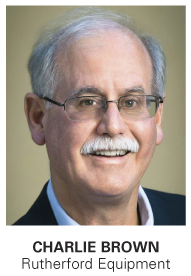Wednesday, March 9, 2016
Charlie Brown has joined Rutherford Equipment Inc. (Covington, Ga.) as an outside sales representative, serving customers in eastern and central North Carolina as well as portions of South Carolina. Brown has 40 years of experience in the propane industry, and has held a number of positions including plant manager, division manager, division sales manager, and account manager. 


